Almost like a rite of passage in today’s fast-paced world, staying up all night to finish something is expected.
With this in mind, more individuals are relying on caffeine-containing drugs to help them remain up for long periods of time, despite the body’s natural yearning for sleep.
Unfortunately, there are some people who can’t remain awake with just a cup of coffee. As a result, many people turn to caffeine pills.
In a nutshell, Vivarin Caffeine tablets’ components assist you to stay awake and attentive when you need it the most. It contains 200mg of caffeine and 65mg of calcium, a combination that’ll give you a quick energy boost while keeping you strong and healthy.
Let’s dig deep into the caffeine content and other notable ingredients of the Vivarin caffeine pills!
What are caffeine pills?
In general, caffeine pills are dietary supplements that are filled with- you guessed it- caffeine.
Some caffeine pills contain natural caffeine, while others contain synthetic caffeine.
Caffeine is essentially a drug that stimulates the receptors of the central nervous system and releases adrenaline into the system. As a result, it’ll keep you focused, relaxed, and awake at the same time.
What are Vivarin caffeine pills?
Vivarin markets itself as a ‘caffeine alertness aid’, and they say that this is ‘functional caffeine for mental alertness.
The word that interests me most in this context is ‘functional’. To me, that implies that it’s solely supposed to help keep you awake, rather than anything else.
The pills are clearly supposed to help you become more awake or alert when feeling tired and sleepy, and with around 200mg per pill, that’s about as much as a strong cup of coffee, but without the great taste.
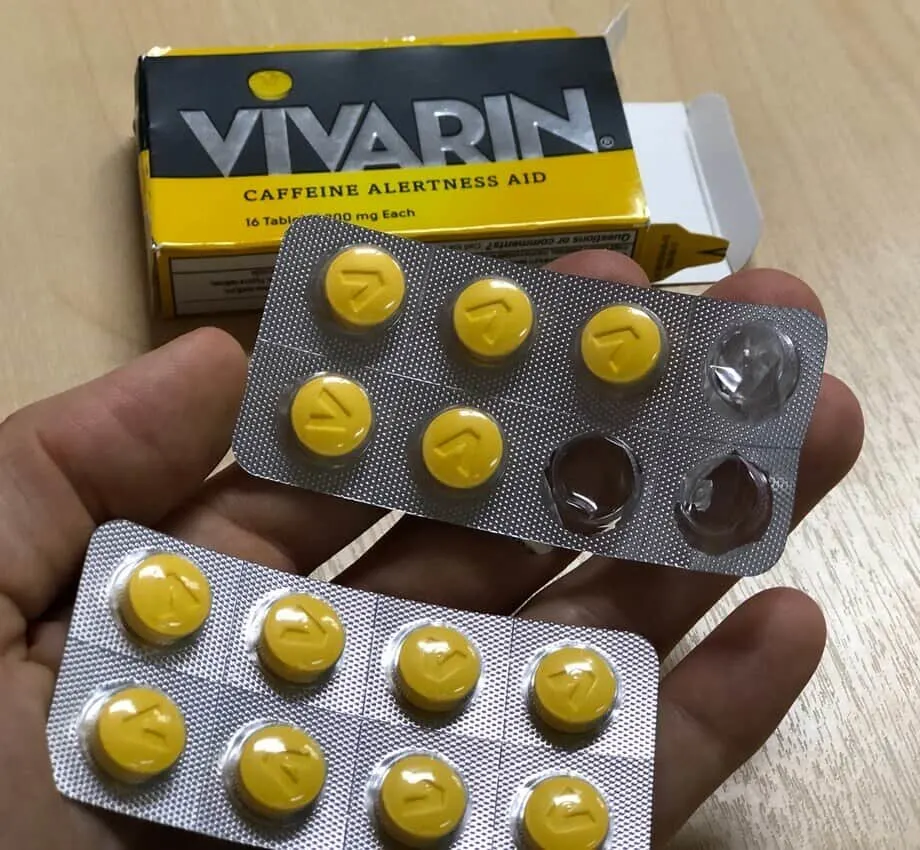
Vivarin Caffeine Pills ingredients
Vivarin has a short and simple ingredient list:
- Caffeine – 200mg
- Calcium – 65mg
Vivarin gets straight to the point here, with no frills or fluff whatsoever.
To be fair, the pills are meant to be swallowed quickly and efficiently, for those who are on the go and can’t afford to waste any time.
Compared to the long ingredients list found with other energy drinks, Vivarin is a positive energy boost for anyone.
The addition of calcium into the pill is to offset the negative effects of caffeine absorbing calcium from other items in your diet, which can be a problem for some individuals.
The only downside is that this might not work for everyone. You might find that Vivarin is not as effective for you as it is for others.
To see how Vivarin’s caffeine content compares to some of the energy drinks with the highest caffeine, check out my other article.
There are also inactive ingredients listed with Vivarin, which are used in helping bind the caffeine into a solid form:
- Carnauba wax
- Colloidal silicon dioxide
- Corn starch
- Croscarmellose sodium
- D&C yellow #10 aluminium lake
- Dicalcium phosphate dihydrate
- FD&C Yellow #6 Aluminium lake
- Hypromellose
- Magnesium stearate
- Microcrystalline cellulose
- Polyethylene glycol
- Polysorbate 80
- Titanium dioxide
Despite the fact that these ingredients are listed as inactive, it’s pretty doubtful as to whether or not these are actually good for you.
In fact, the more reading I do about some of these ingredients, the more concerned I am about them.
I talk more about the dangers of these “inactive ingredients” here with regard to caffeine pills in general.
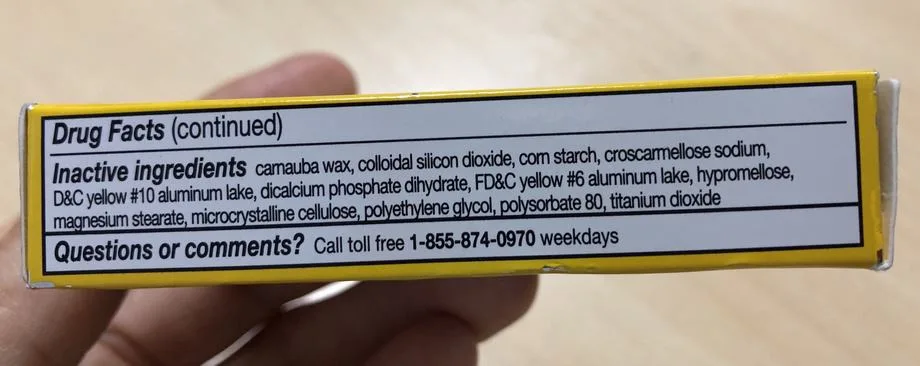
Vivarin Caffeine Pills vs Coffee
Vivarin contains around 200mg of caffeine, and a cup of coffee is also more or less 95mg.
Most regular coffee drinkers drink at least 2 cups a day, so that makes it about 200mg of caffeine as well.
In terms of taste and enjoyment, it’s obvious that coffee wins out here, with no competition whatsoever.
There is a reason why coffee is considered a socialised drug and is widespread across the world. Vivarin, as mentioned before, is more concerned with efficiency- caffeine and an energy boost without having to worry about anything else.
In terms of nutritional value, coffee loses out here, seeing as people often add a lot of creamers and sugar, but if consumed black with no sugar coffee can be very healthy.
Furthermore, you might want to take a look at this table of the maximum recommended caffeine intake by the FDA.
| Age | Recommended Daily Caffeine Intake |
| Teenagers | 100 mg per day |
| Average Adults | 400 mg per day |
How long does a Vivarin caffeine pill last?
The directions on the packaging say that adults and children 12 years of age and over should only take a single tablet every 3-4 hours.
Of course, this differs for people who are habitual caffeine consumers.
People who are used to consuming large amounts of caffeine may not find this pill effective in the recommended dosage because their reaction to caffeine has decreased over time.
You have to take into account your individual sensitivity to caffeine. For some people may be half a pill would work as well as another person who has consumed an entire pill.
How many Vivarin caffeine pills can I take a day?
You should only take a maximum of 2 Vivarin caffeine pills per day.
Any more than that might put you at risk of too much caffeine.
If you are taking Vivarin in conjunction with other caffeinated food or drink (which you really shouldn’t), then a single pill a day should be more than enough.
If you find that you are incredibly sensitive to caffeine but still need that extra energy boost, give REIZE a try!
REIZE has only 50mg of caffeine and gets most of the energy from the taurine, ginseng, and B vitamins.
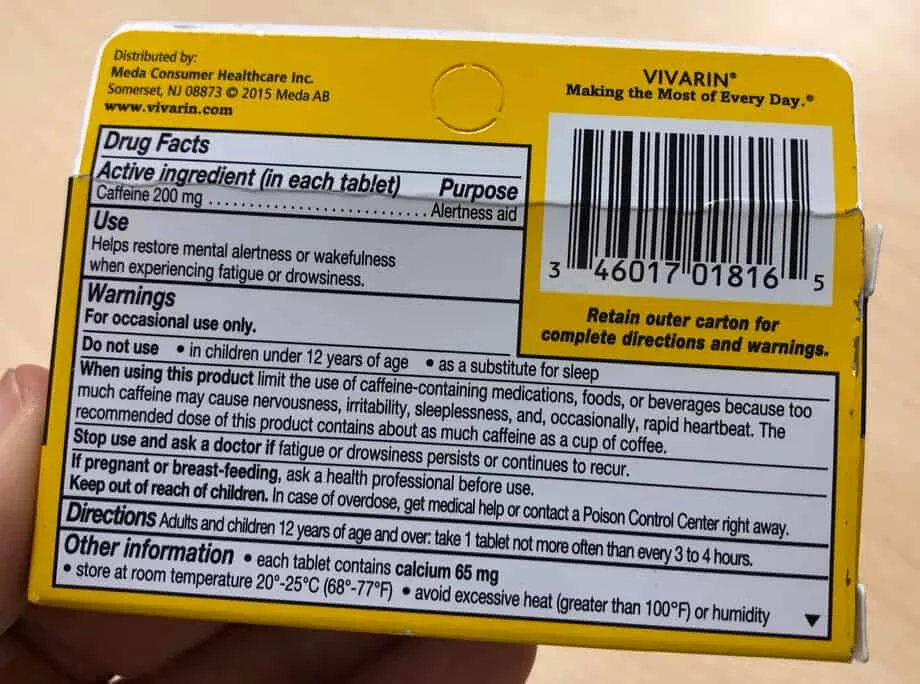
Is it safe to take Vivarin pills every day?
In general, taking caffeine pills daily is safe for most people as long as in moderation.
There are people who are more sensitive to caffeine pills – if you’re one of them, you might suffer some adverse reaction after taking the Vivarin pill.
The Vivarin caffeine pill contains 200mg of caffeine which is still within the maximum limit for caffeine intake.
The FDA’s recommended limit for caffeine is 400mg per day at maximum. This means you can take up to 2 tablets a day if you’re feeling adventurous – I strongly advise not doing so, by the way!
If you really need to take caffeine pills such as Vivarin, one tablet a day once in a while is safe. Don’t overdo it to avoid any adverse effects!
How much do Vivarin caffeine pills cost?
On Amazon, 3 packs of Vivarin Alertness Aid cost around $11 excluding shipping.
Compared to energy drinks out there which cost around $2 per can, this is a great price. However, those energy drinks do contain supplements for energy, like taurine, sugar, and the various other ingredients they use to make a tasty drink.
Check my article here for a guide to buying cheap energy drinks.
Where to buy Vivarin caffeine pills?
You cannot get Vivarin caffeine pills directly from their website, but you can get them online from a number of different sites. Shop around and compare prices before buying.
You can also get them from your local stores, like CVS, Walgreens, and Target. Your local pharmacy may also stock them.
What side effects do Vivarin caffeine pills have?
Typical side effects that are associated with taking caffeine pills in excess are:
- Headaches
- Diarrhea
- Heart palpitations
- Dizziness
- High blood pressure
- Insomnia
- Muscle jerking (jitters)
- Disorientation
But caffeine pills also have certain positive side effects:
- Energy boost (of course)
- Better focus and concentration
- Better memory retention
- Can help reduce headaches
Are caffeine pills good for you?
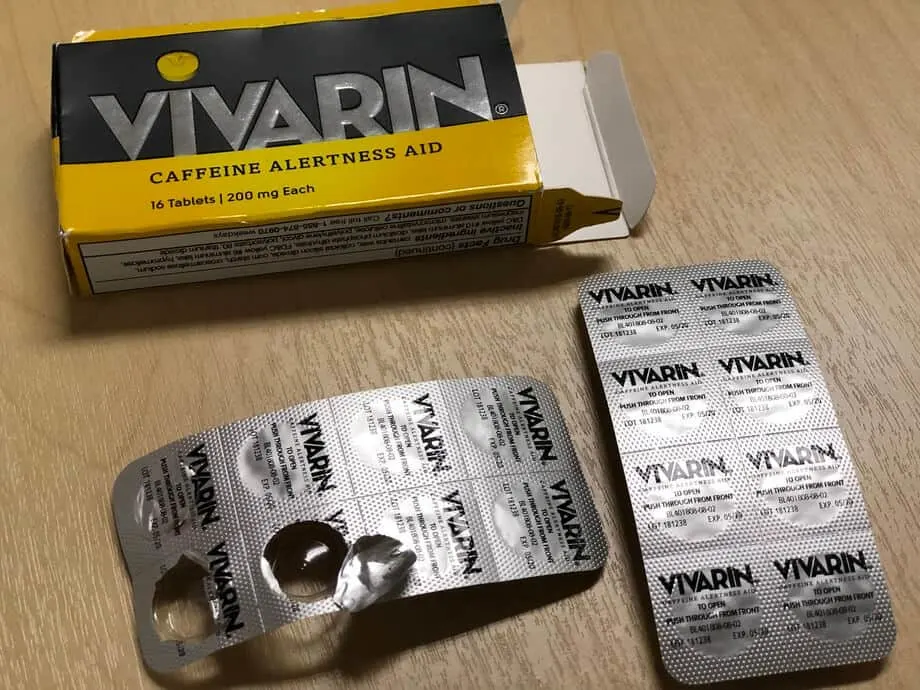
Caffeine pills can help you overcome sleepiness and have been shown to help with increased focus and concentration.
If you really need a concentrated and short boost of energy to get you through a task, then caffeine pills are good!
However, these should not be relied on in daily life, so they’re for occasional use only.
Caffeine does not only help keep you awake and alert, but it also has some other positive benefits, like helping you reduce the symptoms of a migraine, and it can be a laxative as well.
Are caffeine pills bad for you?
If over-consumed, caffeine pills are definitely bad for you.
A caffeine overdose is rare, but serious because the side effects that come with a caffeine overdose can affect your ability to do work and in extreme cases, can give you a panic attack.
Taking an excess of caffeine pills can also cause you to be dependent on them, like any other drug. This can then cause withdrawal symptoms like intense fatigue, headaches, and anxiety.
Natural vs Synthetic Caffeine Pills
What are natural caffeine pills?
Natural caffeine pills are pills that derive their caffeine from natural sources, that include plants like guarana berries, tea leaves, coffee beans, and yerba mate.
The caffeine is first extracted from these natural sources, and when they have been distilled into a concentrated form, they are put into a pill.
What are synthetic caffeine pills?
Synthetic caffeine pills are made from the chemical synthesis of urea and chloroacetic acid, as opposed to being extracted from plant material.
Although both natural and synthetic caffeine is chemically identical, the sources are completely different.
As of now, there are no studies that say which is better than the other, and synthetic caffeine does not seem to have any negative side effects as compared to natural caffeine.
It’s not really clear whether Vivarin contains synthetic or natural caffeine. Since they didn’t state which was used, I’m willing to bet that they’ve used synthetic caffeine, as it’s probably cheaper- that’s my opinion though, I could be wrong!
Caffeine Pills vs Energy Drinks
Caffeine
In terms of caffeine, the average energy drink contains anywhere from 50mg of caffeine (REIZE) to 300mg of caffeine (Bang), so it does fluctuate wildly depending on the drink of your choice.
Caffeine pills typically contain around 200mg of caffeine, which is quite significant as well, such as in the case of Vivarin.
Sugar
Caffeine pills typically do not contain any sugar at all, because the taste isn’t really the main selling point here.
Other energy drinks usually do add sugar and artificial sweeteners to their drinks, which may not be ideal for anyone looking to reduce their sugar consumption.
Price
With regards to the price, caffeine pills definitely win out. Vivarin costs around $11, while a single can of energy drink typically costs around $2-3.
If you’re looking for something really cost-effective, caffeine pills are the way to go.
However, there are some very affordable energy drinks available too. Not all energy drinks are a rip-off.
Vivarin Caffeine Pills Review
Visuals
I thought that the packaging was effective and definitely screamed alertness.
I guess it was supposed to invoke the idea that these pills give the same ‘buzz’ that a bee does. I might be extrapolating a little bit here.
The pills themselves were bright yellow, always a good choice when trying to market something as keeping you awake- it’s such a cheerful colour that no one can resist.
Taste
I included this because I have done this for all my other reviews, but really there isn’t much to say here. You guys know how a pill works- you swallow it directly.
In the case that you do accidentally end up tasting it, it’s usually more bitter than anything else.
I would not recommend chewing it, and make sure to wash it down with the liquid of your choice!
Effect
Personally, I’d always thought that caffeine affects me quite a lot, so I took half a pill at first just to be safe.
Since the package directed me to take it when experiencing fatigue or drowsiness, I took it in the afternoon after experiencing the effects of a food coma smack.
To my disappointment, it didn’t give me the big jolt of energy I was hoping for, so I went ahead and took the other half about half an hour after taking the other one.
While I definitely wasn’t sleepy anymore (perhaps I had digested everything), I didn’t feel like I was particularly alert or high functioning as I usually do when consuming an energy drink.
Alternatives to Caffeine Pills
There are lots of great energy drinks on the market. If you’re interested in trying out liquid energy drinks, which have a better consumption experience, take a look at:
- Monster
- Red Bull
- Rockstar
- Celsius
- XS
- Monster Import (different from original Monster)
- Rip It
- Bing energy drink
- Bang (no relation to Bing!)
- Guru
- Xyience drinks
Powdered energy drinks are also a great option, and they tend to be more convenient and also more affordable than a lot of the more famous energy drinks.
Check out these energy powder mixes:
- Gfuel
- Zipfizz
- Advocare Spark
- REIZE (10 out of 10)
REIZE (10 out of 10)
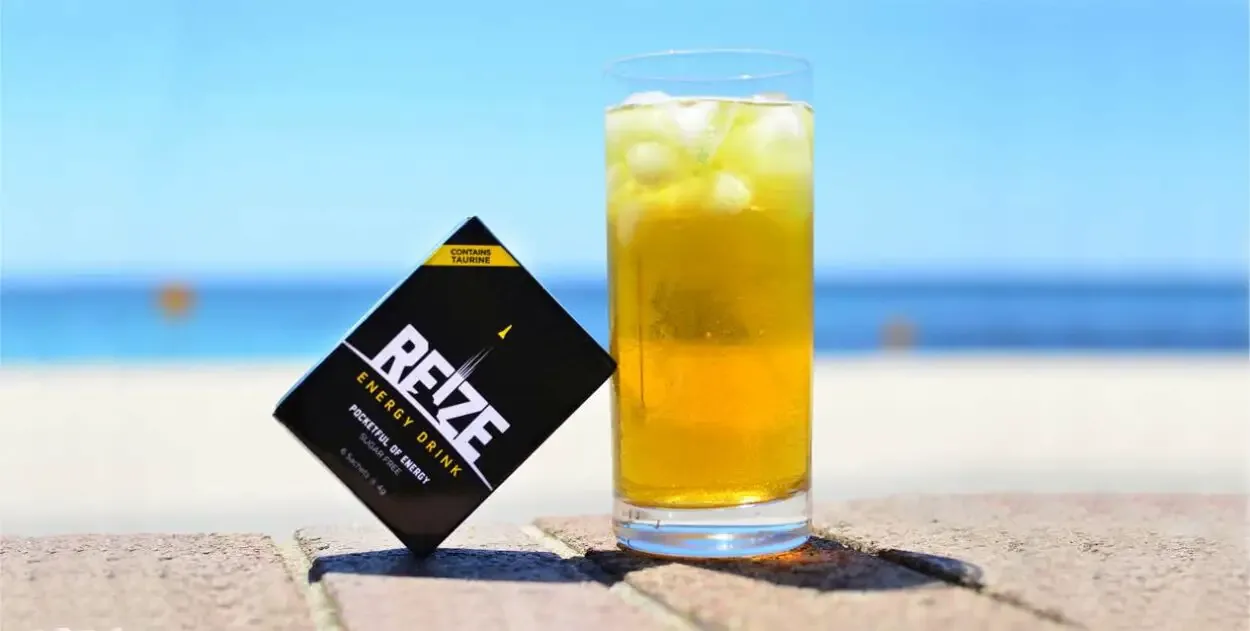
In particular, REIZE is a powdered energy drink that is easy to carry around and make – just add water.
With 50mg of caffeine, REIZE doesn’t have the same amount of caffeine that your typical caffeine pill does. However, it is a lot more convenient and can be tailored to your individual tastes since you can add all types of liquids to it- soda, hot water, cold water, flavoured juice, it’s up to you!
REIZE ships right to your door for around $1 per drink, pretty comparable to Vivarin and much more affordable than most energy drinks on the market.
Give REIZE a try today and you might just find that you prefer REIZE to Vivarin caffeine pills.

